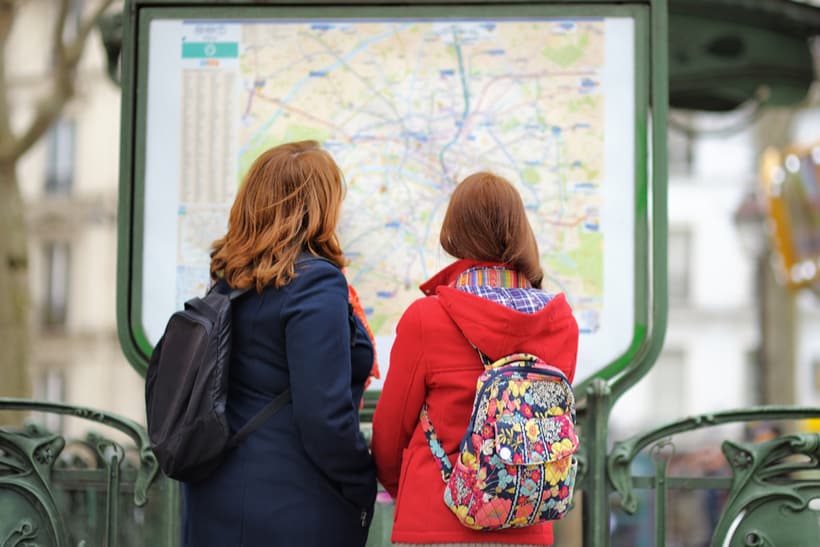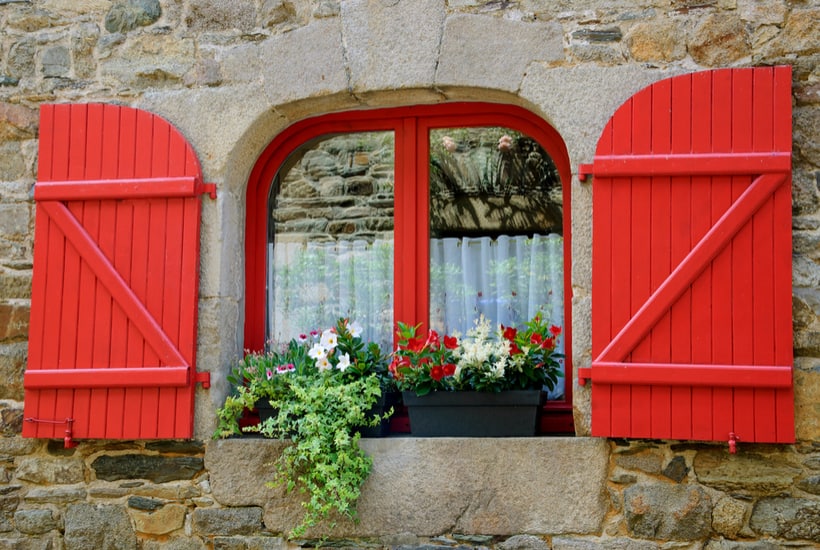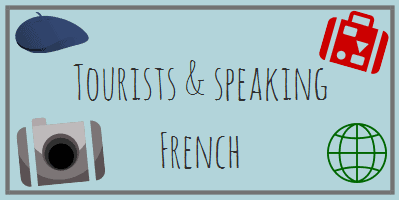In the 7 years I’ve lived in France, I’ve seen my fair share of bad tourist behavior from people who don’t know anything about etiquette in France. Here are the 3 top France travel tips that go a long way… but tourists often forget about them entirely or just aren’t aware of these tips on Paris etiquette for tourists.
Paris etiquette for tourists: 3 Things tourists forget!

Photo credit: www.shutterstock.com / Maria Sbytova
No one expects tourists to speak great French or know all about etiquette in France. That would be absurd. But what is reasonable is to be aware of cultural norms and do your best to be respectful of French culture and the French when on their turf. We’re visitors, after all. It’s a learning experience and we all make mistakes, so start your next trip in France off on the right foot. I’ve put together my top 3 France travel tips based on what I know about etiquette in France and what I’ve observed over the years.
Even if you're just passing through an area of #France for a day or two, knowing these 3 #travel tips goes a long way toward how you're perceived and treated.Click To TweetEven if you’re just passing through an area of France for a day or two, knowing these 3 things below goes a long way toward how you’re perceived and treated in France (and elsewhere!). They are the top overarching Paris travel tips that apply to all areas of France actually in pretty much any situation.
These are the Golden Rules of etiquette in France, if you will, and I’m taking a hard stance because yes, these France travel tips are that important.
The good news is they’re easy to implement. Keep in mind that ignoring the 3 France travel tips I talk about below will most likely result in a sub-par experience. I can almost guarantee that French people will be less than friendly and accommodating toward you if you don’t take these French culture and etiquette tips into consideration.
So let’s get to my France travel tips that work for Paris or anywhere.
3 Paris and France etiquette tips you need to know for your next trip:
1. They forget that “bonjour” is a mandatory word.
In some areas of the world, you can get away with starting off an interaction without saying hello. Where you’re from, maybe greetings are always considered polite but not mandatory.
In France, beginning any interaction with a “bonjour” is as close to mandatory as any rule is for foreigners and locals alike. Forgoing the compulsory bonjour (or “bonsoir” in the evening) is not only out of touch with French norms but it will communicate to French people that you’re lacking in basic education. This is one of those etiquette in France tips that is so easy to nail every time that once you know it, make a mental note so it’s automatic.
So who do you say bonjour to? EVERYONE YOU HAVE AN EXCHANGE WITH! (But one thing, don’t hug them.) Say bonjour before kicking off any interaction. If you’re going to be speaking to another human about something, even just a quick question, you need to say bonjour first. Yes, really.
This does not mean shouting it across a restaurant to a busy bartender with his back turned to you. That would be silly. But if a hostess or waiter approaches you, say bonjour. Same goes for the grocery store employee, the shopkeeper, the market vendors, the ticket collector, the guy on the street you approach for directions, etc.
Depending on where and how you were raised, saying hello first and foremost may seem like common sense. In some households in the USA, approaching anyone ever and starting to talk before saying hello first would be majorly rude.
But the more I observe my own people, it’s commonplace to just go up to someone in a service position and launch into your request. “Give me a half pound of ham,” said a guy at the Publix deli counter back stateside in Florida last year, forgetting not only his hello but a thanks and please too. Same thing at Starbucks. A woman busily scrolling through her Instagram feed didn’t even look up when she ordered. “A grande skim vanilla latte,” she said and the employee rang her up. In both cases, the employee didn’t blink and got right to work.
Neither of those instances would fly in France. Everyone in earshot would think you’re majorly rude and maybe not say anything, but they’d sure as heck think it. And in some cases, I’ve seen employees just stare at the person or repeatedly say bonjour and do nothing until the person realizes their error and starts again by saying bonjour.
Like any big city, people get away with rudeness all the time, but that’s not a reason to be rude yourself. I feel like as foreigners, we need to step up our game and be better than all of the tourists doing the wrong thing.
Sure, you can do whatever you want and bark orders at people, but why? In Paris, locals are used to tourists not knowing the rules, but if you’re reading this, it means you’re interested in making a good impression because you care about these things. Go you! I like you already. 😉
Like any big city, people get away with rudeness all the time, but that's not a reason to be rude yourself. I feel like as foreigners, we need to step up our game. These are my top 3 #France travel tips tourists forget.Click To TweetHere’s the thing. This is one of those things about etiquette in France that goes beyond merely being polite and respectful of French culture. In my opinion, this goes toward letting another human being know they’re being seen. They’re not just there to serve others because it’s their job or to help you because you’re a tourist.
Before there’s any “ask,” there’s a brief but necessary acknowledgment of “Hey, I see you, fellow human. I know you don’t have to help me but I’m starting off by being polite. Let’s proceed, please.”
If you want to learn a few more polite phrases that will help you make a good first impression, I’ve written about that here. This comprehensive French travel phrase post (with audio) might also be of interest as well as my readers’ best France travel tips. I also have an eGuide with beginner France travel info for a standout trip. Here are some American social norms that don’t exist in France.
2. They forget to make an effort with French (even if they know only 3 words)
Beyond #1 above, thank you (merci) and please (s’il vous plaît) go a long way. Three words make a difference. Au revoir (goodbye) if you want to get fancy, so 4. If you didn’t learn them in your middle school French class, learn and practice them before you even get off the plane. It does not matter if you have an accent that makes you barely understandable.
Do your best to try, even if you think you are self-conscious. What’s way more ridiculous than how you think you sound is a tourist not even trying at all and just walking up to a French person and saying hello in English. NO! This is France.
I know it feels weird to bust out your limited French, especially if the person you’re speaking to speaks some English, but do it anyway.
In the name of all things holy, do your best to learn at least hello, thanks, and please in French. And use them often. Everyone is capable of that. Otherwise, you risk being perceived as someone who is culturally tone deaf and will receive the corresponding service. I guess if that sits fine with you, go for it, but really, how hard is it to learn 3 words?
Here’s a post that goes into why making an effort in French as a tourist is super-duper important. My take is if you can do simple things to have a better experience, why not?

Photo credit: www.shutterstock.com / Elena Dijour
3. They forget to experience things without making judgment calls.
This is France, where things are done the French way. It’s not America. English is not the native language. We need to be respectful of the people and the country we’re visiting. That means to keep cultural judgments to ourselves and not audibly criticize the French (or at all!) after a limited experience in the country.
You wouldn’t believe how many times I’ve been around someone who’s loudly proclaiming they don’t have a big hotel bathroom and nice bed to their traveling companions or that the French are always inconveniencing tourists with their stupid store hours and strikes.
Or that French waiters are SO rude (after only one restaurant experience, and forgetting to say bonjour, because of course they did).
What someone is really saying when they exclaim, “This hotel room is tiny,” is “This hotel room is tiny compared to what my money would get me back home.” Or, “This restaurant’s service is super slow” means “This restaurant’s service is super slow compared to what I’m used to back home.”
Go ahead and notice the differences, but try to resist making judgment calls that deem one way of doing things better than the other and then getting all bent out of shape about it. Part of traveling is taking in the experience and the cultural differences, no matter how uncomfortable they can sometimes be.
It is normal to notice differences and talk about them. It’s a fun topic of conversation and I do it often on this blog. Culture shock is real and I remind myself to not make judgment calls all the time. It’s not normal, though, to expect everything to be like it is at home and then write off France as being “less than.”
If you’re looking for a replica of your home country, just with different scenery, why spend all the money and time to get to France? Take in all the differences, observe, learn, and experience them.
France is nothing like the USA in a lot of ways. That’s a good thing! How boring would the world be if we experienced the same things everywhere across the globe? Yes, certain things about France (or anywhere) can be maddening, but use it as a lesson to just go with the flow.
Oh, and enjoy your trip to France!
***
What Paris travel tips and info about etiquette in France do you have to add?
Check out my ebook with even more France travel tips!
PIN MY Paris etiquette for tourists post:







I find North Americans in general are very judgmental. I mean, we all are (and by “we”, I mean “humans”!), but North Americans often have a very Manichean view of the world–things are either “good” or “bad”. So they overpraise and criticize but the thing is, it’s never *that* simple… To stay on topic, for instance, a typical attitude would be that “all French food is absolutely amazing” (it’s not, really, there’s plenty of crappy food, junk food, etc. in France) and “all French cheat on their SO” (… no!).
Of course, I’m stereotyping and plenty of N. American have a much more nuanced view of the world!
Hey Juliette! Interesting perspective and I tend to agree, although I feel like I’m generalizing by agreeing with you. I can’t really say if most N. Americans are black/white in their thinking, but I will say I’ve met a LOT of people who overpraise the French… that they’re “ALL SO FRIENDLY” or the food is amazing everywhere, like you said. People can’t all be put into the same box, good or bad. Thank you for reading and you’ve given me something to think about. 😉
As far as being judgmental, In my experience, French can be extremely judgemental of other countries culture and food. . There tends to be this belief that everything French is the best in France. Or maybe I just have really warped and snobby French friends..
Lovely post. I used those words while visiting France and it really did make my experience much better.
Thanks for reading, Carolyn! They really are magic words. Glad you had a good experience!
This reminds me of when I was traveling in Amsterdam with a friend who got frustrated when trying to talk to a bus driver who only spoke Dutch.. “Don’t these people speak English?!” she fumed. Uh, not necessarily.
I would say that when traveling to any country, it’s good to learn a few words and brush up on cultural norms. Any good guidebook usually has a section on this and you should read up before you go. Getting just a few basics right can make a big difference in how you are perceived. Oh, and politeness is always appreciated.
I appreciate this article. Thank you for posting it.
Thank you for taking the time to read it!
Just spent 3 months in France with a very limited knowledge of French, but was so pleasantly surprised with everyone saying Bonjour, even people I passed walking down the sreet to the market. And even when I made a mistake, we’d both laugh and they’d tell me the right way to say the word I’d messed up.
Another thing I love is when you leave any store they say Au Reviour and Bonne Journee.
Should be mandatory everywhere I think.
This is so true, and simple! I do the above and have a few more French phrases. This is often funny as the French person to whom I am speaking, assumes I know French and continues to talk in French. I get this dumb look on my face and they laugh and often carry on in English or we make do with what we each know. I have found the French to be so kind and helpful if you just put forth a little effort as you say.
The same tips are very helpful in Quebec too. My experience was that “Bonjour” both brought a friendly response and a gracious switch to English, undoubtedly due to my accent.
Hi Diane: I’ve been back and forth many times to France. Each time I learn something. Years ago, I didn’t realize all the restaurants or places that serve food would be closed on Sundays (this was southern, rural France) and I was starving all day until I found a French bar where the doors were open. The owner’s family was inside eating. They were very nice and fed me a nice dinner. Another time I rented a campervan and had a glorious time shopping in one of those modern, huge supermarkets. I had no idea that one needs a special “coin” to unlock the shopping carts but a local gave me a coin and helped me get my cart. Inside, I didn’t realize one has to weigh all your fruits and veggies and write down the SKU number of the item. The checkout lady was very forgiving and managed to ring up all my items even though I had not weighed or copied the SKU number. Customs and laws may be different in other places. It pays to keep an open mind and learn while traveling.
So true, Mimi! Thank you for sharing your experience. I completely agree with you 🙂
I have wanted for decades to visit France and we are working toward that reality. It is so exciting to have this blog to build my knowledge (and anticipation!). Thank you!
So happy to hear that my content has helped you, Suzette. It’s amazing that the trip is finally coming to fruition. 🙂 Enjoy it!!
I have a few – after spending a lot of time in Paris for both work and pleasure I would offer the following suggestions in addition to the important ones you mentioned.
EMBRACE THE CULTURE – do not expect the French to “Americanize” things to make you comfortable. Try new foods, preferably French, maybe even have the server order for you and take a chance… they will immediately fall in love with you!
DO NOT DRESS LIKE A TOURIST – while you certainly do not need to look like a fashion model you should be dressed at least at a “casual Friday” level of dress. There are still places in Paris where sneakers and jeans are not allowed and men are expected to wear a sport coat or blazer. Ditch the cargo shorts and flip flops if you expect to be taken seriously – plan for stylishly comfortable when out and about in the city.
LOWER YOUR VOICE – perhaps it’s just me but when traveling abroad it always seems like Americans are the loudest people around – especially in groups. I found lowering my voice and speaking slower made a huge difference in the way people interacted with me.
Parisians, and the French in general, have an undeserved reputation for being rude but I can say nothing is further from the truth. They are proud of their culture, their language and what it means to be French. It’s not a competition – when traveling there (or anywhere for that matter) remember that you are a guest… if you are a good guest then the people you meet will certainly be good hosts.
To a large extent, many problems American experience in France seem to me a matter of “densely populated big city” vs “less densely populated town/city” issue. In any densely populated city, including for instance London, space is at a premium and you cannot hope to have the big bedrooms and bathrooms one would experience in a motel in the US (or you have to pay a premium for it). By the way, this is the same in San Francisco or New York, to the best of my recollections.
The same applies to space around tables in restaurants, and whether speaking very loud is acceptable. I don’t think new yorkers, in a crowded diner, or londoners in a restaurant (pubs are different), would like to have their conversation covered by the shouts of the neighbouring table. Similarly, hollering around like you’re the only people in the car in the London tubes is likely to get you some stares, perhaps you will get told off.
Not understanding the local language compounds the issue.